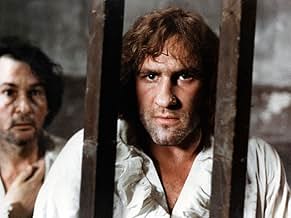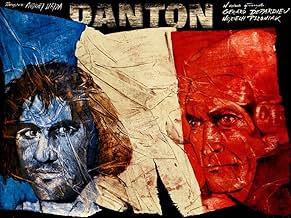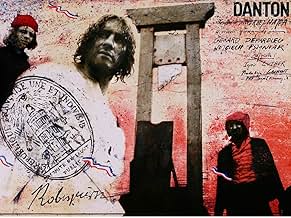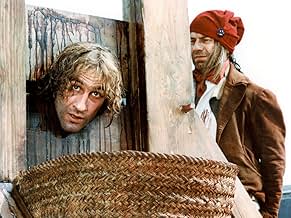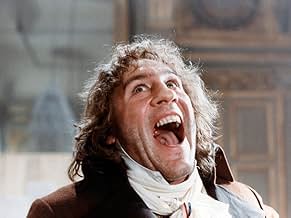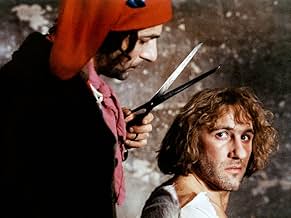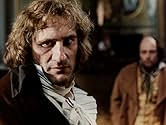IMDb RATING
7.4/10
7.9K
YOUR RATING
In 1793, as the Terror begins in France, Georges Danton, a champion-of-the-people, returns to clash against Maximilien Robespierre and his extremist party.In 1793, as the Terror begins in France, Georges Danton, a champion-of-the-people, returns to clash against Maximilien Robespierre and his extremist party.In 1793, as the Terror begins in France, Georges Danton, a champion-of-the-people, returns to clash against Maximilien Robespierre and his extremist party.
- Won 1 BAFTA Award
- 7 wins & 7 nominations total
Patrice Chéreau
- Camille Desmoulins
- (as Patrice Chereau)
Alain Macé
- Héron
- (as Alain Mace)
Storyline
Did you know
- TriviaRobespierre and all the characters in his faction are played by Polish actors speaking in Polish, dubbed into French for the French release, while Danton and all the characters in his faction are played by French actors speaking in French.
- GoofsRobespierre tells Jacques Louis David to remove Fabre d'Englantine from the painting of the Tennis Court Oath. David objects, saying, "But he was there," but removes d'Englantine. In truth, d'Englantine did not take part in the Tennis Court Oath, since in 1789 he was not a deputy to the Estates General. Thus, the film falsifies history.
- Quotes
Robespierre: For the country's good we must be ruthless. We can't afford to be just. We'd have to rule by terror. You know what that is? Terror is nothing but despair.
- Crazy creditsAnne Alvaro gets an "and introducing" credit ("et pour la première fois à l'écran").
- Alternate versionsThe dialogue in the dubbed version with American voice actors sometimes differs sharply from the original: for example, Robespierre's last words to Saint-Just are not the dismissive "Don't wake me when you leave" ("Ne me réveillez pas quand tu sortiras") but the prophetic "Whatever happens will happen soon" (so that, like Danton, he apparently realises he will shortly meet Danton's fate).
Featured review
Danton was a hero and one of the founders of the French Revolution of 1789. This movie is set five years later and the revolution has morphed into something ugly. While initially the revolution promised freedom, at this point the small committee running the country is extremely repressive and is a dictatorship. Danton and his friends were angry at how the country wasn't better off in 1794 than it was BEFORE they got rid of their king, so they begin criticizing the government. The movie begins as the printer who makes critical pamphlets concerning the government is beaten and his business is destroyed. So much for "liberty, equality and fraternity"! So, as a result of being silenced this way, Danton et al begin publicly criticizing the government. Eventually, Robespierre (the leader of the committee) and his cronies trump up charges, have a show trial and get rid of the dissent. Some have mentioned that the Polish director, Wajda, also intended this to be a criticism of his own nation--which, at the time, was Soviet-dominated and very repressive as well. This makes sense as you see the movie unfold--especially when the government destroys all dissent "in the name of the people".
The acting is fine, the story compelling and I have no major criticism of the film. However, I really wish the ending had been handled differently. Especially because other than history lovers and French people, most probably have no idea that this execution helped to end the government. AFTER this purge of Danton in April 1794, Robespierre himself was executed in July 1794 because the country had just had enough--plus, those surviving Frenchmen knew that they, too, would face the guillotine sooner or later if this sick system remained in place. Some sort of an epilogue would have been nice--such as showing the soldiers coming for Robespierre. He responded by trying to kill himself first, but he only succeeded in blowing off part of his face--still alive, he was guillotined shortly afterward. This would have been a dandy little epilogue and could have been done in about five minutes. However, not showing a connection between Danton's death and the fall of the government is an odd thing to omit.
The acting is fine, the story compelling and I have no major criticism of the film. However, I really wish the ending had been handled differently. Especially because other than history lovers and French people, most probably have no idea that this execution helped to end the government. AFTER this purge of Danton in April 1794, Robespierre himself was executed in July 1794 because the country had just had enough--plus, those surviving Frenchmen knew that they, too, would face the guillotine sooner or later if this sick system remained in place. Some sort of an epilogue would have been nice--such as showing the soldiers coming for Robespierre. He responded by trying to kill himself first, but he only succeeded in blowing off part of his face--still alive, he was guillotined shortly afterward. This would have been a dandy little epilogue and could have been done in about five minutes. However, not showing a connection between Danton's death and the fall of the government is an odd thing to omit.
- planktonrules
- Mar 19, 2006
- Permalink
- How long is Danton?Powered by Alexa
Details
- Release date
- Countries of origin
- Language
- Also known as
- Дантон
- Filming locations
- Jossigny, Seine-et-Marne, France(interiors: Danton's house)
- Production companies
- See more company credits at IMDbPro
Contribute to this page
Suggest an edit or add missing content



